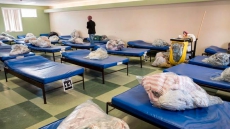VANCOUVER — A new study says the luge track used at the 2010 Winter Olympics in Vancouver, where an athlete died on the opening day of the Games, was not significantly "more dangerous" than other venues.
The study released Wednesday by researchers at the University of British Columbia into the death and the track's safety found that high speed and athlete inexperience have been the top contributing factors to injuries and accidents on the track in Whistler, which is also used for bobsleigh and skeleton events.
"With an overall injury rate of 0.5 per cent, the track is pretty comparable to 16 other sliding tracks across the planet,” said lead investigator Peter Cripton, a professor of mechanical engineering whose research focuses on biomechanics.
"It was the athletes’ experience level and start location that had significant impacts on the frequency and severity of injuries."
Nodar Kumaritashvili, 21, a single-luge sledder from Georgia, was travelling at nearly 144 kilometres per hour when he rocketed off corner 13 of the challenging track during an Olympic practice run on Feb. 12, 2010. He was thrown off his luge and over the sidewall of the track when he lost control, striking an unprotected steel support pole at the end of the run.
Researchers checked the records of 43,200 runs involving more than 2,600 sliders at the Whistler Sliding Centre from 2007 to 2011.
They also reviewed medical reports and incident logs from the same period, linking them to the start location, each athlete’s experience level and the location of the incident.
"The lower the start position, the lower the speed and the safer the athletes tended to be. They had significantly higher risk for injury if they started higher up,” said Cripton.
Whistler Sport Legacies, which operates the sliding centre, could not immediately be reached for comment.
Consistent with the effect of higher speeds, the study says three out of every four incidents occurred near the end of the track at corners 13 and lower.
During track testing a number of bobsledders crashed, including Canadian Olympic medallist Pierre Lueders. Many were tossed out at the track's signature turn, corner 13, which was dubbed ''50-50'' by an American bobsledder to reflect the odds of getting through it right-side up.
Corner 13 is part of a series of turns from 12 to 15. While the curves are not that sharp the sliders by then have reached maximum speed.

Researchers found more experienced sliders were at a lower the risk of injury. Sliders who had logged more than 150 runs had reduced injury risks, while those with just 30 to 59 runs under their belts had the highest risk of being hurt.
The report recommends that sliding track operators continuously monitor and log track incidents as they happen, using cameras and staff.
"Track operators should close the track and analyze near-misses, particularly for cases where an athlete was nearly ejected from the track,” Cripton added.
"Immediate corrective measures can be taken, such as increasing the height of the barriers on the sides."




